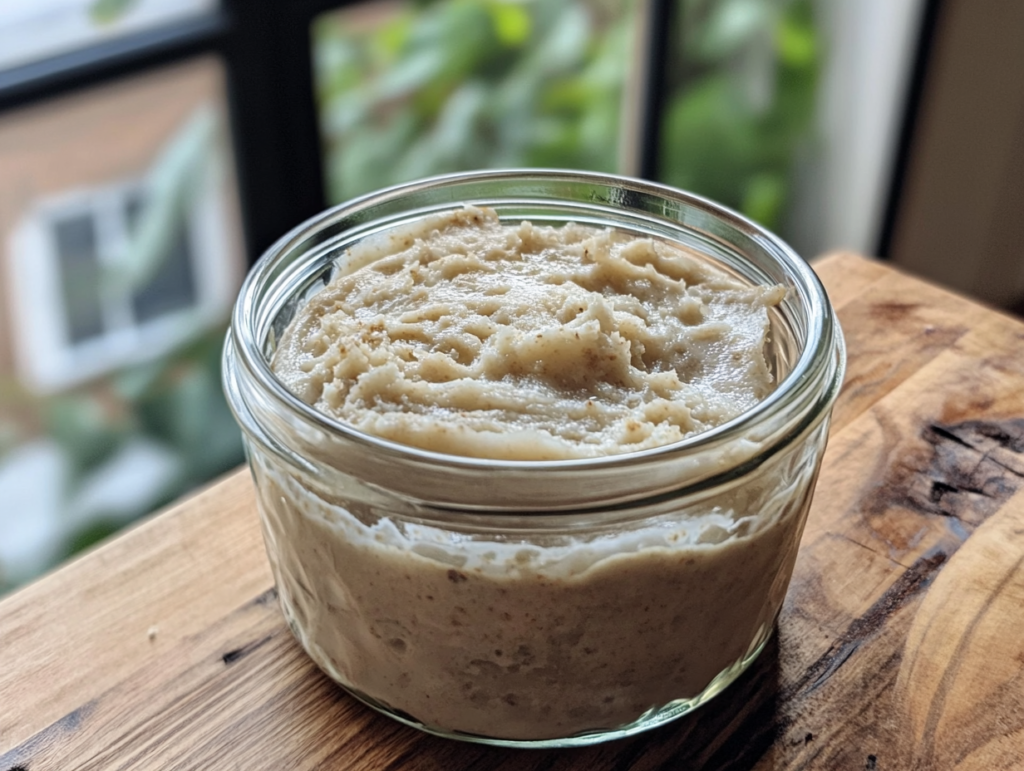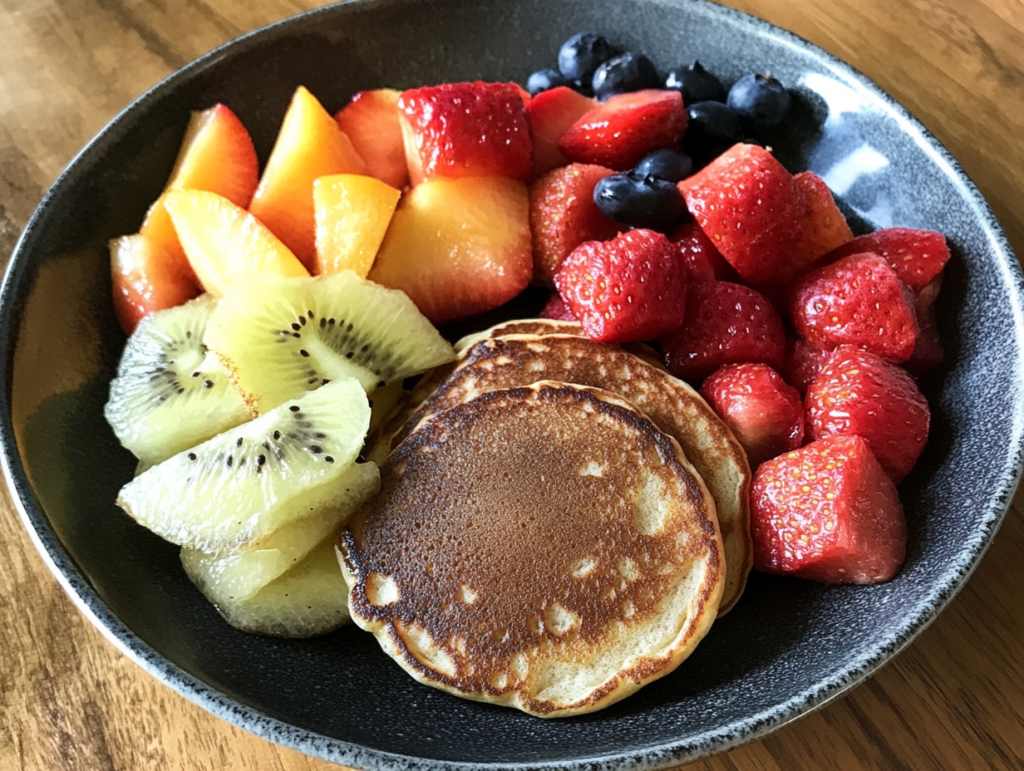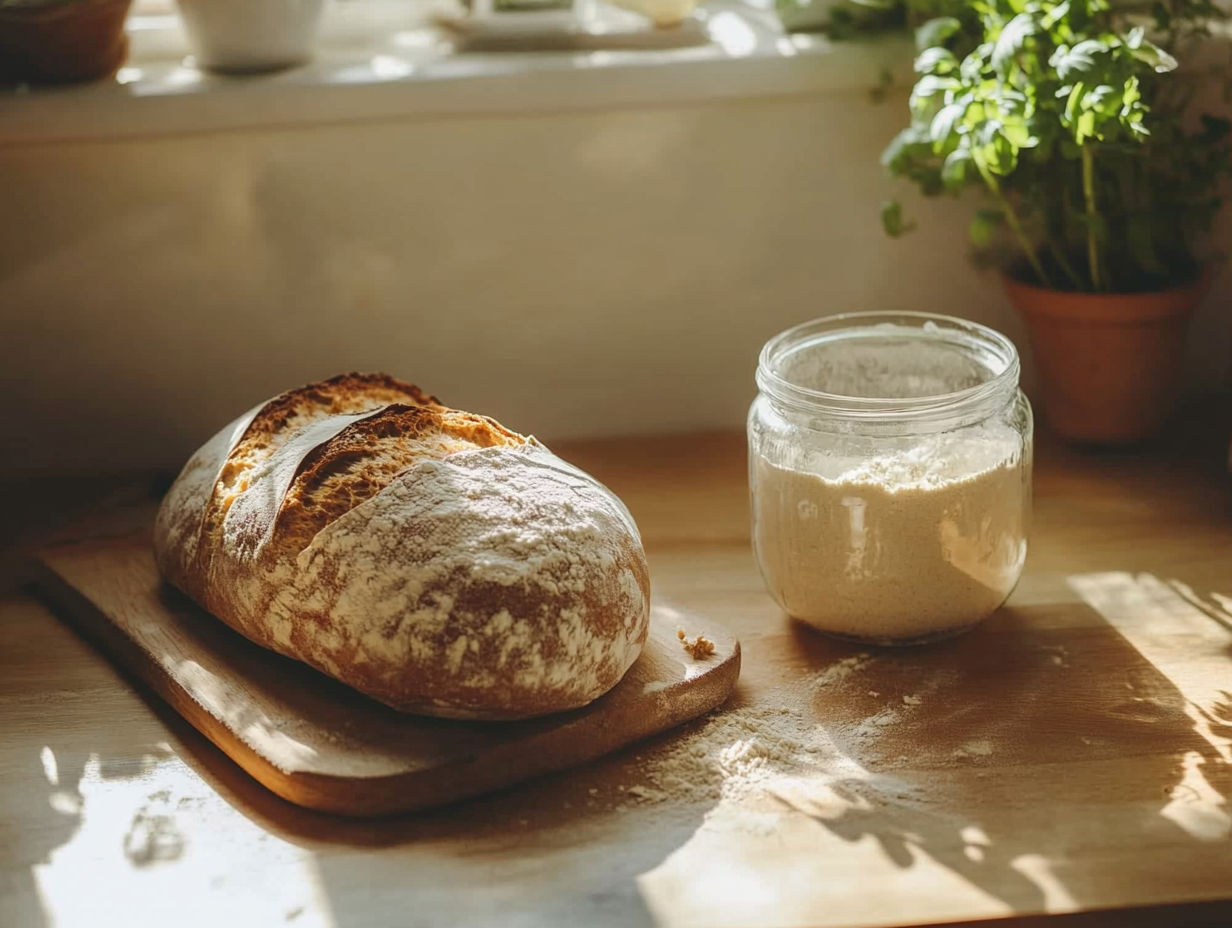Have you ever wondered, is sourdough discard good for the gut? This leftover from sourdough starter maintenance might seem like waste, but it’s far from it. Rich in prebiotics, organic acids, and enzymes, sourdough discard offers surprising benefits for gut health. Instead of throwing it away, you can use it to support digestion and create delicious, gut-friendly recipes. Let’s explore why sourdough discard deserves a closer look for your well-being.
Understanding Sourdough Discard
What Is Sourdough Discard?

Before we get to the gut-health angle, let’s first unravel what sourdough discard actually is. If you’ve ever made sourdough bread, you know the drill: maintaining your sourdough starter involves regularly “feeding” it with fresh flour and water. To keep your starter healthy and manageable, you have to remove a portion each time you feed it. This removed portion is what we call sourdough discard.
So, is it useless? Far from it. While it doesn’t have enough active yeast to bake bread on its own, it’s still full of flavor and nutritional goodies. Think of it as the “extra” that has a lot more to offer than you might expect.
Nutritional Composition of Sourdough Discard
Here’s where things get exciting. Sourdough discard contains:
- Beneficial bacteria: Thanks to the fermentation process, discard is rich in lactic acid bacteria, which are known to support gut health.
- Enzymes: These can aid in breaking down food and improving digestion.
- Organic acids: These are known to create a gut-friendly environment by balancing the pH.
- Vitamins and minerals: Trace amounts of B vitamins, calcium, and magnesium sneak their way into the discard too.
The Gut Microbiome: A Brief Overview
How the Gut Microbiome Functions
Imagine your gut as a bustling city, with trillions of bacteria, fungi, and other microorganisms working together to keep the system running smoothly. This is your gut microbiome, a critical part of your overall health. It influences everything from digestion to immunity and even your mood.
But like any city, the gut thrives on balance. When the good bacteria are outnumbered by the bad, it’s chaos. Fermented foods like sourdough starter and discard can help restore harmony.
The Role of Fermented Foods in Gut Health
Fermented foods are like reinforcements for your microbiome. They introduce beneficial bacteria and create an environment where these good guys can thrive. Yogurt, kimchi, kombucha—you’ve probably heard of these gut-boosting stars. But sourdough discard? It’s the underdog in this story, quietly working to support your digestion and keep your gut in tip-top shape.
Probiotic Potential of Sourdough Discard
Is Sourdough Discard a Probiotic Source?
Here’s the million-dollar question: can sourdough discard be considered a probiotic? The answer isn’t entirely straightforward. While discard contains lactic acid bacteria, which are the same bacteria found in many probiotics, the heating process during cooking or baking can kill them. However, that doesn’t mean discard doesn’t support gut health.
Prebiotics vs. Probiotics: Where Does It Fit?
Discard plays more of a prebiotic role. Prebiotics are the food that feeds the good bacteria in your gut. Think of it like this: probiotics are the seeds, and prebiotics like discard are the water and sunshine. Together, they help your gut garden flourish.
Benefits of Sourdough Discard for Gut Health
Digestive Enzymes in Sourdough Discard
Digestive enzymes in discard act like the unsung heroes of the fermentation process. They break down complex carbohydrates into simpler sugars, making food easier to digest. For individuals with sensitive stomachs, this can mean less bloating and more comfort.
The Role of Organic Acids in Gut Support
Organic acids, like lactic and acetic acid, are another win for your gut. These acids help maintain an acidic environment in your digestive system, which can discourage harmful bacteria from growing while giving the good bacteria a helping hand.
Curious about making other comfort foods? Here’s the Key to Gluten-Free Baking?
Common Misconceptions About Sourdough Discard
Is Sourdough Discard Harmful?
Let’s bust a myth: sourdough discard is not harmful unless it’s been left to spoil. The word “discard” might sound ominous, but it doesn’t mean the product is bad or unsafe. With proper storage and usage, discard is as wholesome as any ingredient in your pantry.
Understanding the Difference Between Discard and Spoilage
It’s all about knowing the difference. Fresh sourdough discard smells tangy and slightly sour—a sign of its lactic acid bacteria. Spoiled discard, on the other hand, smells off or moldy and should be thrown out immediately.
Ways to Use Sourdough Discard for Gut Health
Recipes That Preserve Gut Benefits

While baking bread might not preserve the probiotics, there are still ways to use discard to maximize its gut benefits:
- Pancakes and waffles: Quick cooking at lower temperatures retains some nutritional value.
- Crackers and flatbreads: Thin layers cooked lightly preserve organic acids and prebiotics.
- Smoothie boosts: Add discard to smoothies for a tangy kick and a prebiotic boost.
Tips for Fermenting Sourdough Discard Safely
Keep it simple:
- Store discard in an airtight container in the fridge.
- Use it within a week to avoid spoilage.
- If you’re fermenting discard further, make sure it’s in a clean jar to avoid contamination
Who Should Avoid Sourdough Discard?
Dietary Restrictions and Gut Health Concerns
While sourdough discard can be beneficial for many, it’s not for everyone. If you’re following a strict diet, you might need to think twice before diving in. Here are a few scenarios where caution is needed:
- Gluten Sensitivity or Celiac Disease: Sourdough discard still contains gluten, even if fermentation reduces it slightly. For those with gluten intolerances or celiac disease, even trace amounts can cause discomfort.
- Low-FODMAP Diet Followers: If you’re managing IBS or similar conditions, sourdough discard might contain trace carbohydrates that could trigger symptoms.
For those on the fence, consulting a healthcare provider can help determine if discard fits into your nutritional plan.
Allergies and Intolerances to Watch For
Even if gluten isn’t an issue, other allergens might sneak in. Some starters are created with specific flours (like rye or whole wheat), which could trigger sensitivities. Always check what kind of flour your starter was fed and adapt accordingly.
Addressing Common Problems with Sourdough Discard
Troubleshooting Fermentation Issues
Fermentation is as much an art as it is a science, and sometimes things don’t go as planned. Here are a few common hiccups and how to fix them:
- Discard smells off: If the scent is overwhelmingly sharp, rotten, or moldy, it’s time to toss it. Keep your starter well-fed to maintain a fresh batch of discard.
- Watery layer on top (hooch): This is natural and a sign your starter is hungry. Simply stir it back in or pour it off before feeding.
Storing Sourdough Discard Safely
Proper storage is key to keeping discard usable. Always refrigerate it in a sealed container. For longer storage, freeze it in small portions—perfect for quick use in recipes!
Expert Opinions on Sourdough Discard and Gut Health
Nutritionists’ Take on Fermented Foods
Experts agree that fermented foods, including sourdough, offer a wealth of health benefits. According to registered dietitians, incorporating sourdough discard into your diet can:
- Support digestion with its organic acids and enzymes.
- Complement gut health by feeding the beneficial bacteria in your microbiome.
While it’s not a magic pill, discard is a convenient and tasty way to improve your overall diet.
Scientific Studies Supporting Gut Health Benefits
Science backs it up too. Research highlights how fermented foods can enhance gut microbiota diversity, and while discard isn’t extensively studied, its composition mirrors other fermented products. For instance:
- Lactic Acid Bacteria: Known to play a role in reducing inflammation and boosting gut health.
- Digestive Enzymes: Linked to improved breakdown of complex carbs, which can alleviate bloating and discomfort.
Ways to Use Sourdough Discard for Gut Health
Recipes That Preserve Gut Benefits
If you’re wondering how to make the most of sourdough discard, the key is to preserve its gut-friendly properties as much as possible. While high-temperature cooking can destroy some beneficial bacteria, low-heat and no-heat recipes can retain its prebiotic and nutritional benefits. Let’s explore some creative and healthful options:
- Sourdough Discard Pancakes: Quick and easy, these pancakes keep cooking time short and retain some of the discard’s nutritional value. Add bananas, oats, or chia seeds for an extra gut-health boost.
- Crackers and Flatbreads: These thin, crispy snacks are lightly cooked, which means they still offer some prebiotic benefits while being a delightful treat for dipping or snacking.
- Fermented Crepes: By allowing your discard batter to ferment for several hours, you give the lactic acid bacteria a chance to thrive before cooking.
- Smoothie Add-Ons: For a no-heat option, mix a tablespoon of discard into your smoothie. It adds a tangy flavor and gives your gut bacteria something to feast on.
Tips for Fermenting Sourdough Discard Safely
To make the most of your sourdough discard, proper handling and storage are crucial. Follow these tips to keep your discard safe and effective:
- Use a Clean Jar: Store discard in a sterilized container to avoid contamination.
- Refrigerate Immediately: Keep it cold to slow down bacterial growth, preventing spoilage.
- Label Your Container: Always note the date you stored the discard to track its freshness.
- Avoid Cross-Contamination: If your starter or discard has been exposed to mold, discard the entire batch.
Addressing Common Problems with Sourdough Discard
Troubleshooting Fermentation Issues
Even seasoned sourdough bakers face occasional challenges. With discard, the most common issues involve smell, texture, and storage. Here’s how to handle them like a pro:
- Odd Smell: If your discard smells overly alcoholic or rancid, it’s likely over-fermented. Feed your starter more often to keep the discard fresh.
- Watery Separation (Hooch): This liquid layer is natural but indicates your starter is hungry. Stir it back in or pour it off before feeding.
- Sticky or Slimey Texture: This can happen if discard is stored for too long. Fresh discard should have a smooth, paste-like consistency.
Storing Sourdough Discard Safely
Storing sourdough discard properly is essential for maximizing its usability and health benefits. Here are some do’s and don’ts:
- Do refrigerate: Discard can last up to a week in the fridge, but check for spoilage regularly.
- Do freeze for long-term storage: Pour discard into an ice cube tray and freeze for easy, portioned use.
- Don’t leave discard at room temperature for extended periods: It can become a breeding ground for harmful bacteria.
Expert Opinions on Sourdough Discard and Gut Health
Nutritionists’ Take on Fermented Foods
Experts in gut health agree: fermented foods, including sourdough discard, offer significant benefits. According to nutritionists:
- Digestive Support: The enzymes in discard can make food easier to digest.
- Microbiome Boost: Prebiotic compounds in discard help feed beneficial gut bacteria, promoting a balanced microbiome.
- Nutritional Enhancements: Trace vitamins and minerals from the fermentation process add a bonus to your diet.
Scientific Studies Supporting Gut Health Benefits
While specific research on sourdough discard is limited, studies on sourdough starters and fermented foods provide promising insights:
- Lactic Acid Bacteria’s Role: Research shows these bacteria can improve digestion, reduce inflammation, and promote gut health.
- Improved Nutrient Absorption: Fermentation breaks down antinutrients like phytic acid, making minerals like iron and zinc easier for the body to absorb.
- Support for IBS and Bloating: Some studies suggest fermented foods may help alleviate symptoms of irritable bowel syndrome (IBS), though more research is needed.
FAQs About Sourdough Discard and Gut Health
- Can sourdough discard replace probiotics?
Not exactly. While discard contains beneficial compounds, it’s not a substitute for high-potency probiotic supplements. However, it can complement a balanced diet. - How much discard should I eat for gut health?
Start small—about a tablespoon or two in a recipe is enough. Gradually increase as your body adjusts. - Is it safe for pets to consume sourdough discard?
No, discard contains compounds that can be harmful to animals, especially if uncooked. - Does freezing sourdough discard kill bacteria?
Freezing slows bacterial activity but doesn’t kill it entirely. Discard retains its prebiotic benefits after freezing. - Can discard go bad even if refrigerated?
Yes, discard can spoil if left too long. Check for off smells, mold, or discoloration before using. - Does sourdough discard help with constipation?
The fiber and enzymes in discard may support digestion and relieve mild constipation, though results vary by individual.
Is Sourdough Discard Good for the Gut?
The answer is a resounding yes—but with a few caveats. Sourdough discard, often dismissed as a waste product, holds significant potential for improving gut health. Its prebiotic properties, organic acids, and enzymes make it a valuable addition to a gut-friendly diet.
By understanding how to use and store discard properly, you can unlock its full potential while avoiding common pitfalls. Whether you’re whipping up pancakes, crackers, or even a tangy smoothie, discard proves that sometimes the simplest ingredients are the most powerful.


4 thoughts on “Is Sourdough Discard Good for the Gut?”